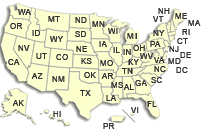|

PUBLICATIONS
Annual Water Data Report
USGS Publications Warehouse
USGS IN YOUR STATE
USGS Water Science Centers are located in each state.

|
Water-Quality Assessment of the Albemarle-Pamlico Drainage Basin,
North Carolina and Virginia--Environmental Setting and Water-Quality
Issues
Open-File Report 95-136
By Gerard McMahon and Orville B. Lloyd, Jr.
Full Report (PDF, 80 pages, 24 Mb)
Abstract
The Albemarle-Pamlico drainage study unit is
one of 60 units of the U.S. Geological Survey's
National Water-Quality Assessment Program, and
includes the large river basins which drain into the
Albemarle and Pamlico Sounds-the Chowan,
Roanoke, Tar-Pamlico, and Neuse River Basins. The
study unit includes about 28,000 square miles and has
an interrelated set of environmental characteristics
which strongly influence water quality. The chemical
and physical nature of these characteristics are the
dominant controls on baseline water quality in the
study area. About 50 percent of the study area is
forested, slightly more than 30 percent is agricultural,
about 15 percent is wetlands, and less than 5 percent is
developed. Three million people live in the study area,
and activities related to agriculture and development
have caused increased concentrations of constituents
such as nutrients, pesticides, and suspended sediment.
About two-thirds of the 36 to 52 inches of
precipitation in the area reenters the atmosphere by
evapotranspiration. About one-third of the remaining
precipitation reaches streams by overland runoff; the
remainder recharges the water table aquifer, where
much of the water eventually discharges to streams as
ground water. Thus, ground-water quality has a
substantial influence on surface-water quality,
particularly during dry weather.
In 1990, about 152,900 tons of elemental
nitrogen and 10,500 tons of elemental phosphorus
either were applied to crops as fertilizer or fixed by
biological processes, and in 1987, about 43,500 tons of
nitrogen and 12,200 tons of phosphorus were produced
as animal wastes. In addition, about 1,300 tons of
selected herbicides and 400 tons of selected
insecticides were applied to crops in 1990. Some 249
permitted point sources discharged 410 million gallons
per day, containing an annual load of 5,800 tons of
nitrogen and 1,800 tons of phosphorus, to the study
area in 1990. Data from 1970-79 indicate that mean
annual suspended-sediment yields for selected
forested, agricultural, and developed urban basins in
North Carolina are 50, 250, and 550 tons per square
mile, respectively.
In order to facilitate comparisons, much of the
data were compiled by hydrologic unit. Homogeneous
areas, or strata, representing the most prevalent
combinations of environmental factors, such as land
use, soils, and geology, were defined. Future data
collection and analyses will be designed to answer
objective-related concerns about the relations between
important water-quality conditions and these study-unit strata.
Citation:
McMahon, Gerard, and Lloyd, O.B., Jr., 1995, Water-quality assessment of the Albemarle-Pamlico drainage basin, North Carolina and Virginia--Environmental setting and water-quality issues: U.S. Geological Survey Open-File Report 95-136, 72 p.
|
For more information, contact |
North Carolina Water Science Center
U.S. Geological Survey
3916 Sunset Ridge Road
Raleigh, North Carolina 27607
(919) 571-4000
E-mail
|
|
